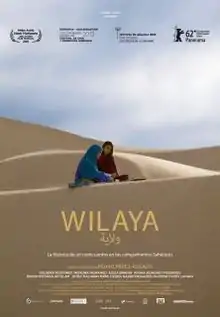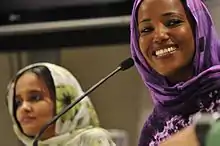Wilaya (film)
Wilaya (Arabic: ولاية, also known as Tears of Sand[1]) is a 2011 Spanish film directed by Pedro Pérez Rosado. The film is a minimalist drama about a Sahrawi refugee family suddenly confronted with the death of the mother and the return of the younger sister, who had lived most of her life in Spain, reflecting the separation of many Sahrawi families.
| Wilaya | |
|---|---|
 Theatrical release poster | |
| Directed by | Pedro Pérez Rosado |
| Produced by | Jose María Morales |
| Written by | Pedro Pérez Rosado |
| Starring | Nadhira Mohamed, Memona Mohamed, Aziza Brahim, Ainina Sidagmet, Mohamed Mouloud |
| Distributed by | Wanda Visión |
Release date |
|
Running time | 88 minutes |
| Language | Hassaniya Spanish |
Plot
Fatimetu is a Sahrawi girl who returns for the burial of her mother to the Sahrawi refugee camps after 16 years living in Spain. Her older brother Jatri tells Fatimetu that, in her last will, her mother left her both the family's jaima (tent) and the responsibility of taking care of her handicapped sister Hayat. Fatimetu reluctantly accepts the responsibility. She buys an old pickup truck and finds work transporting goods between the camps (wilayas), but Fatimetu is torn between life in the desert and the memories of her Spanish foster family and friends.[2][3]
Main cast
- Nadhira Mohamed — Fatimetu
- Memona Mohamed — Hayat
- Aziza Brahim — Sdiga
- Ainina Sidagmet — Said
- Mohamed Mouloud — Jatri
Awards and nominations

- Abu Dhabi Film Festival New Horizons Competition Best Actress (Memona Mohamed, winner)[4]
- Malaga Film Festival Gold Biznaga Best Film (nominee)[5]
- Malaga Film Festival Silver Biznaga Best Original Soundtrack (Aziza Brahim, winner)[6]
- Luxor Egyptian & European Film Festival Gold Djed Feature Film Competition (winner)[7]
- Algiers International Film Festival Best Fiction Feature Film Competition (nominee)[8]
- 27th Goya Awards Best Film (nominee)[9]
- 27th Goya Awards Best Revelation Actress (nominee)[10]
- 27th Goya Awards Best Production Coordinator (nominee)[10]
- 27th Goya Awards Best Film Editing (nominee)[10]
- 27th Goya Awards Best Costume Designer (nominee)[10]
- 27th Goya Awards Best Sound (nominee)[10]
- 27th Goya Awards Best Director (nominee)[10]
- 27th Goya Awards Best Original Screenplay (nominee)[10]
- 27th Goya Awards Best Original Song (nominee)[10]
- 27th Goya Awards Best Cinematographer (nominee)[10]
- 27th Goya Awards Best Artistic Director (nominee)[10]
- 27th Goya Awards Best Revelation Actress (nominee)[10]
Filming locations
The film was shot entirely at the Sahrawi refugee camps located in Tinduf, Algeria.
References
- "Tears of Sand ǀ 2011 ǀ ADFF Archive". Sanad Film Fund. Retrieved 2019-11-07.
- "Panorama - Wilaya". Berlinale.de. Retrieved 08-10-2012. Check date values in:
|accessdate=(help) - "Panorama Internacional- Wilaya". ficg.mx. Retrieved 08-10-2012. Check date values in:
|accessdate=(help) - "New Horizons Competition - Best Actress (split prize) – Memona Mohamed, Tears of Sand (Spain)". Abudhabifilmfestival.ae. Retrieved 08-10-2012. Check date values in:
|accessdate=(help) - "Sección Oficial a Concurso: Wilaya". Festivaldemalaga.com. 2012-04-24. Retrieved 08-10-2012. Check date values in:
|accessdate=(help)(in Spanish) - "Palmarés oficial del 15 Festival de Málaga. Cine Español". Festivaldemalaga.com. 2012-04-28. Retrieved 08-10-2012. Check date values in:
|accessdate=(help)(in Spanish) - "Awards - Feature Film Competition". Luxorfilmfest.com. Retrieved 08-10-2012. Check date values in:
|accessdate=(help) - "Saharawi people's hardships highlighted at Algiers International Film Festival". Sahara Press Service. Retrieved 11-12-2012. Check date values in:
|accessdate=(help) - "Premios Goya 2013". Premios-goya.fotogramas.es. Retrieved 08-10-2012. Check date values in:
|accessdate=(help) (in Spanish) - "Las Candidaturas - Wilaya". Premiosgoya.academiadecine.com. Retrieved 09-01-2013. Check date values in:
|accessdate=(help) (in Spanish)